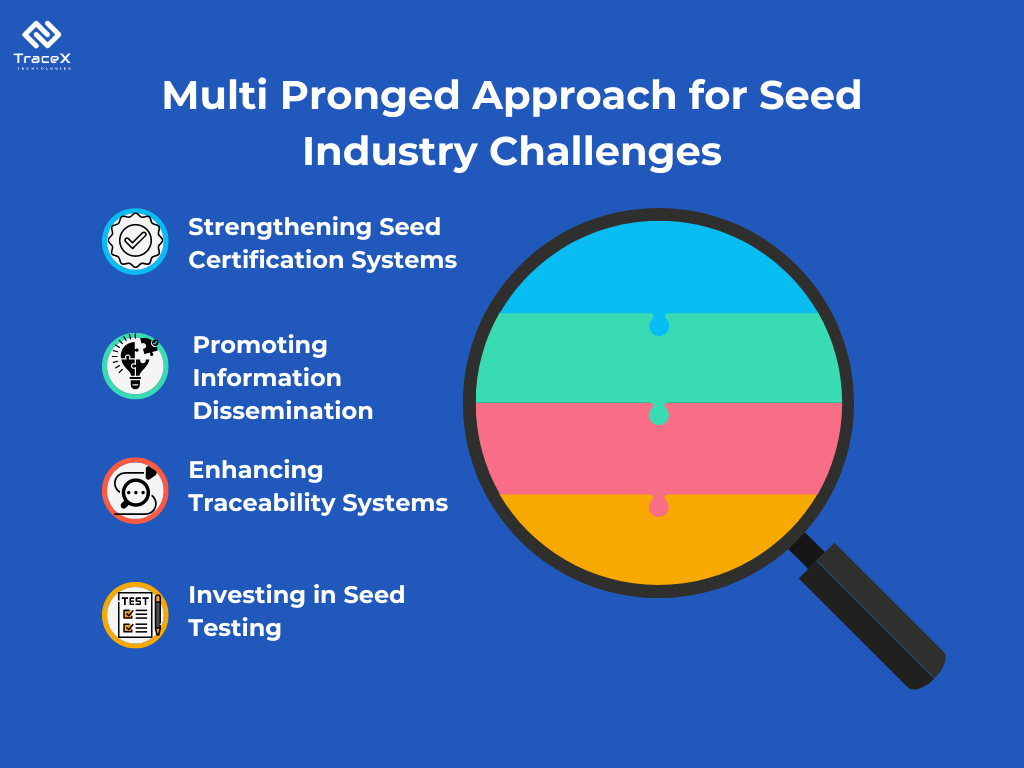Contact: +91 99725 24322 |
Menu
Menu
Quick summary: Explore the importance of forward traceability in the Indian seed industry. Learn how advanced traceability solutions ensure seed quality, combat spurious seeds, enhance transparency, and boost farmer trust, driving sustainability and productivity in agriculture.

India’s agricultural sector is the backbone of the nation’s economy. However, a critical challenge threatens its potential: the lack of robust forward traceability in the seed industry. Low-quality or spurious seeds can lead to stunted plant growth, decreased yields, and ultimately, financial losses for farmers. Seeds without proper certification might carry pests or diseases, jeopardizing entire crops and potentially spreading problems to neighbouring farms. Without verifiable information about seed origin and quality, Indian farmers struggle to access premium markets and export opportunities.
Forward traceability, a system that tracks seeds from their source to the point of sale, holds the potential to alleviate these pain points. However, implementing such a system in India’s vast and complex agricultural landscape presents its own set of challenges.
In the agriculture sector, the quality and authenticity of seeds play a crucial role in determining crop yields and the overall success of farming operations. Unfortunately, the prevalence of spurious seeds in the market has been a significant challenge for farmers, leading to poor harvests and economic losses. Forward traceability, powered by blockchain technology, offers a promising solution to this problem. This blog explores how forward traceability can be implemented in the seed industry, using blockchain solutions to ensure seed authenticity, improve transparency, and ultimately enhance agricultural productivity.
Forward traceability refers to the ability to track the movement of a product from its origin through the entire supply chain until it reaches the end consumer. In the context of the seed industry, forward traceability involves tracking seeds from the production stage through distribution and retail to the final planting by farmers. This comprehensive tracking system provides visibility and accountability at each step, ensuring that the seeds are genuine and of high quality.
The Indian seed industry plays a vital role in ensuring food security for the nation. However, the lack of transparency and rampant seed adulteration pose significant challenges, threatening both farmers’ livelihoods and agricultural productivity.
In some cases, proper certification procedures may not be followed, leaving farmers with no guarantee of seed quality or genetic purity. Farmers often lack access to crucial information about the origin, variety, and treatment history of the seeds they purchase. Unclear pricing mechanisms can leave farmers vulnerable to exploitation by unscrupulous seed sellers. The current system might not provide farmers with a swift and effective way to address issues with poor-quality seeds.
Mixing lower quality seeds with certified varieties or using expired seeds is a common practice, impacting yield potential. Counterfeit seeds that resemble popular varieties but lack the desired genetic traits are often sold at lower prices, leading to significant losses for farmers.
Inadequate storage facilities and mishandling of seeds can compromise their germination rate and overall quality. The lack of readily available and affordable seed testing facilities makes it difficult for farmers to verify seed quality themselves.
Spurious seeds, also known as counterfeit or fake seeds, are unauthorized and substandard seeds that are sold under the guise of legitimate brands. These seeds often fail to germinate properly, resulting in poor crop yields and significant financial losses for farmers. The proliferation of spurious seeds is a serious concern in many regions, including Telangana, where farmers rely heavily on high-quality seeds for their agricultural activities.
These challenges have a domino effect on the agricultural sector:

Blockchain technology, with its decentralized and immutable ledger system, offers a robust solution for enhancing traceability in the seed industry. By recording every transaction and movement of seeds on a blockchain, stakeholders can ensure that the data is secure, transparent, and tamper-proof. This technology provides an auditable trail of seed provenance, which is crucial for verifying seed authenticity and quality.
Here’s how blockchain can revolutionize the seed supply chain:
1. Enhanced Transparency:
2. Combating Seed Adulteration:
3. Strengthening Trust and Accountability:
4. Additional Benefits:
TraceX Technologies has pioneered the use of blockchain technology to combat the issue of spurious seeds in Telangana. Their blockchain-based traceability platform enables seamless tracking of seeds from production to the point of sale, ensuring that only genuine seeds reach the farmers.
TraceX’s blockchain solution ensures that every batch of seeds is authenticated and verified at each stage of the supply chain. This prevents the infiltration of spurious seeds and guarantees that farmers receive high-quality seeds.
The solution provides real-time tracking of seeds, enabling stakeholders to monitor the movement of seeds at every step. This real-time visibility helps in identifying and addressing any issues promptly.
By maintaining a transparent and immutable record of seed transactions, the solution ensures accountability among all stakeholders. Farmers, distributors, and retailers can trust the integrity of the data recorded on the blockchain.
The solution empowers farmers with access to accurate information about the seeds they purchase. They can verify the authenticity and quality of the seeds using blockchain records, making informed decisions for their farming activities.
The blockchain solution helps seed producers and distributors comply with regulatory requirements by providing a verifiable trail of seed provenance. This compliance ensures that only certified seeds are available in the market.
The implementation of forward traceability in the seed industry involves several key steps, each of which is facilitated by blockchain technology.
Seed producers register their batches on the blockchain, along with certification and quality assurance details. This initial registration establishes the provenance of the seeds. As seeds move through the supply chain, each transaction and movement is recorded on the blockchain. Distributors and transporters update the blockchain with details of the seed batches they handle. Retailers update the blockchain with sales information, including details of the seeds sold to farmers. This ensures that the entire journey of the seeds is documented. Farmers can verify the authenticity and quality of the seeds they purchase by accessing the blockchain records. This verification process provides assurance and builds trust in the supply chain.
By ensuring that only genuine seeds reach the farmers, forward traceability improves the overall quality of seeds available in the market. This leads to better crop yields and increased agricultural productivity.
Farmers suffer significant economic losses due to spurious seeds. Forward traceability helps in mitigating these losses by preventing the sale of counterfeit seeds.
The transparency and accountability provided by blockchain technology streamline the supply chain, reducing delays and inefficiencies. Stakeholders can coordinate more effectively and address issues promptly.
Consumers, including farmers, develop greater trust in the seed supply chain when they can verify the authenticity and quality of the seeds. This trust enhances brand reputation and loyalty.
Forward traceability ensures compliance with regulatory requirements, reducing the risk of legal issues and penalties. Seed producers and distributors can demonstrate adherence to quality standards.
Forward traceability, enabled by blockchain technology, is a powerful tool for combating the issue of spurious seeds in the seed industry. TraceX’s blockchain solution in Telangana serves as a compelling example of how technology can enhance transparency, authenticity, and efficiency in the seed supply chain. By ensuring that only genuine seeds reach the farmers, forward traceability improves agricultural productivity, reduces economic losses, and builds trust among stakeholders. As the seed industry continues to evolve, embracing forward traceability will be crucial for meeting the demands of modern agriculture and ensuring sustainable growth.
